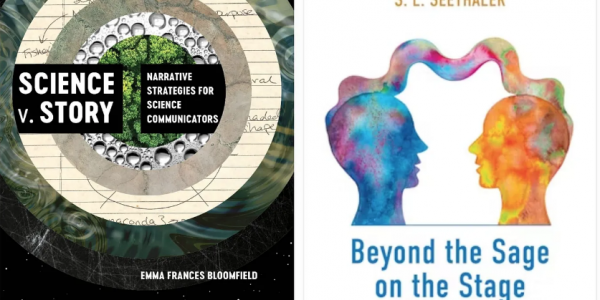Digging Deep into Stories in Science Communication
May 17, 2024
This book review was first published in SciComm Book reviews for the Public Understanding of Science Blog. It is reposted here with permission. The official print version is also now available here. I reviewed two books: Bloomfield, E. F. (2024). Science v. Story: Narrative Strategies for Science Communicators. University of California Press. Seethaler, S. L. (2024). Beyond …
Milk, reservoirs and spillovers: Bird flu in cows
May 10, 2024
On 26 April my sister emailed me from the United States and said “I might have to go over to oat milk”. She was alarmed by reports that bits of bird flu virus had been found in pasteurised milk. She has not gone over to oat milk yet. It seems that there is almost no …
Seeding clouds – seeding doubts
May 3, 2024
In 2009, two things happened in climate change discussions that at first glance seem to be quite unconnected. Firstly, the Royal Society released a seminal report on ‘geoengineering’—the deliberate alteration or creation of weather and climate conditions (which is generally considered unwise). Secondly, the ‘climategate‘ controversy emerged, portraying climate scientists as clandestinely tampering with or …
Xenotransplantation
April 5, 2024
About 25 years ago, I first encountered something called Science and Technology Studies (STS) – a field that examines interactions between science and society (culture, policy etc.). One of the first articles I read, published in 1999, was by Nik Brown on xenotransplantation: “Xenotransplantation: Normalizing disgust”. Using ideas and concepts from STS stalwarts like Mary Douglas …
Vaccine hesitancy in Europe: A conceptual exploration
March 22, 2024
Many things changed rather fast when the Covid-19 pandemic spread around the world at the beginning of 2020. There were new social phenomena, like ‘social distancing’, a so-called non-pharmaceutical intervention intended to stop the spread of the coronavirus. There were new scientific and bodily phenomena, like quickly developed vaccines, so-called pharmaceutical interventions intended to stop …
Making epigenetics familiar: The visual construction of transgenerational epigenetic inheritance in the news
February 23, 2024
Some time ago I wrote a blog post with Aleksandra Stelmach and Alan Miguel Valdez about visuals used to make epigenetics public through the popular lens of transgenerational epigenetic inheritance. I then promised some image analysis. Here is a summary of what we found (I thank ChatGPT for helping me summarise our findings. If you want references, …
John Herschel: A snapshot of his adventures in photography
February 16, 2024
Sitting at home on a miserable day last week, I was reading a tweet, then a blog post by Stephen Case who wrote a book with my sort of title: Making Stars Physical: The Astronomy of Sir John Herschel. That post cheered me up, as I learned something new. I went to the kitchen to …










